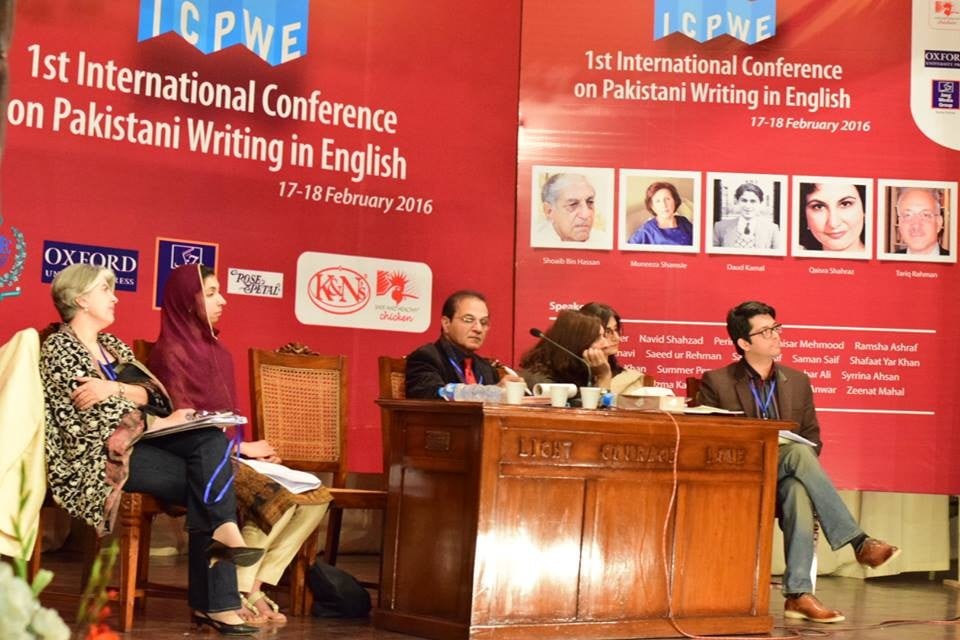
A two-day conference on Pakistani writing in English with exciting sessions and interesting conversation turns out to be a literary blessing

From autumn till the summer begins, Lahore has its annual conference season. Other cities, not to be left behind, have also started catching up. But, were it not for the Oxford University Press, nothing like the Karachi and Islamabad Literary Festivals would have been held. So we should be thankful for such blessings as the KLF, LLF and the ILF. But what about conferences? Well the world has two major types of conferences which I call (1) the cloak-and-dagger conference and (2) the fair/mela conference.
The first one is not much known in Pakistan but it is the parent of all conferences and still given pride of place in Western countries. It is a highly specialised conference with only experts in attendance. Thus, everybody is really a rival of everybody else and is out to find weaknesses and refute theories presented by the other. That is why it is the cloak-and-dagger type of conference.
What we have is the mela-type of conference. There are many variants of this type of conference with the fun element in varying supply but it does not have a dozen scholars sitting around a table hating each other while trying to account for the dark spots of the sun (the sort of thing which happens in the cloak-and-dagger variety).
Such conferences are held everywhere in the world with the difference that in Western countries a VIP is not invited as the chief guest and not even the vice chancellor is visible. The only thing in short supply for the speakers is time. Again this is pretty universal but in Europe and the US one is given fifteen minutes if that is what the programme promises. In Pakistan, as well as the rest of South Asia, seniors are not stopped so they take up the time of juniors and the sessions do not end in time.
If only Pakistanis could have such conferences on the model of Western countries i.e without non-academic VIPs and with strict punctuality, they would be an indispensable part of academic life. But even without these two improvements they are a necessary part of civilised academic or intellectual existence.
Now let me take up the case of a much-needed conference held on the 17th and 18th of February. It was the first conference on Pakistani writing in English and it was much-needed since we have celebrated everything under the sun except our own writing in this language which we have used for two centuries and still have to apologise for. There have been such events at a small scale but nothing as grand as this. In a sense, then, this was a ‘coming-of-age’ of the International Centre for Pakistani Writing in English which Kinnaird College set up and of which the founding director is a well-known poet, writer and literary critic Athar Tahir.
The first welcome feature of the event was that there was no political VIP presiding over it. Only the principal, Dr Rukhsana David, welcomed us. She was the person who had the vision to set up this Centre in the first place so her remarks were most appropriate. Then we had the keynote address by Muneeza Shamsie and there is no one in the country with more intimate knowledge of the history of Pakistani literature in English than her.
There were sessions on poetry, prose, the novel and a number of other subjects. Contemporary novelists were interviewed and people spoke on the writers of the Pakistani diaspora in the world -- especially in the USA and the UK. We all missed Alamgir Hashmi, Bapsi Sidhwa and Zulfikar Ghose who could not make it.
I remembered that when I first started thinking of writing on Pakistani literature in English, Alamgir Hashmi was already an established critic and poet. I had read him and he was the first to help me. Among those I went to at that time were Daud Kamal, Taufiq Rafat and Kaleem Omar. All of them are no more and I went into the past thinking of them and how I had met them first. Each one was mentioned and some had entire papers devoted to them.
I also remembered meeting Ahmad Ali in Karachi with the mild wind from the Arabian Sea fanning us. He too was a voice from the past but the conference made him alive. Shoaib bin Hassan, whom I had missed when I came to Lahore in the eighties for my research, had two papers dedicated to his columns which have now been published as a book.
The two-day conference was filled with exciting sessions and interesting conversation. Even the time-keeping, though not of European precision, was of Berkeley standard (plus fifteen minutes or so). The food and the tea was wonderful and the bookstalls outside the hall provided titles one had been looking for. An added attraction was the presence of foreign experts on Pakistani literature in English whom one had only heard of. It is not possible to name all of them to save space but they were people whose names one can use to conjure with. This is what I call providing role models -- one of the features of any good conference.
Judge it how you will, this was a very successful conference. I am sure Athar Tahir and his team must have spent months planning it. The one thing which all of us recommended in the final session was that it should become an annual feature of the Lahore landscape. I completely agree with this demand.